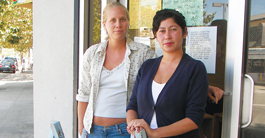home | metro santa cruz index | news | santa cruz | news article

Photograph by Jessica Lussenhop
Good Works: Penelope Jernberg, left, and Veronica Adame plan to continue volunteering with the needle exchange program.
Drop-In Center Dropped
Santa Cruz's needle exchange program is spared, but Front Street location will close.
By Jessica Lussenhop
VERONICA ADAME, a harm reduction supervisor at the Santa Cruz AIDS Project's Drop-in Center, leads an impromptu tour around the small Front Street space. "This is kind of the little living room area," she says, gesturing at some black couches and a television hooked up to an old VCR. "We all watch movies together and it's pretty fantastic." She stops. "It was fantastic," she corrects herself.
On Wednesday, Sept. 2, Adame and the rest of the Drop-in Center staff were informed they are losing their jobs and that, after 10 years, the center will be closing on Sept. 15 for good. "There isn't a place like this that exists in Santa Cruz, a place you can go where you won't be judged," says Adame, tears forming in her eyes. "It's like a family."
The center provides HIV testing and referrals to housing and health services, but it is also used as a meeting place for the center's estimated 900 monthly clients. Clients are permitted to pick up donated clothing, get a bite to eat and play games--and, crucially, exchange dirty needles for clean ones. The center's location across the street from the bus station has made it especially convenient for young transients. "We care about people. We're here for everyone no matter what," says harm prevention specialist Penelope Jernberg. "There's so many people who come here who don't have anywhere else to go."
Merle Smith, executive director at SCAP, says the governor's final round of blue-line cuts eliminated about $300,000 worth of funding that covered staff and kept the doors open. "The facility will no longer be there, but the programming will continue," she says.
The center's confidential needle exchange program will continue with staffing provided by volunteers, and most other services, such as youth and women's hours, mental health referrals and HIV testing will be shifted to the main SCAP offices across the street. Smith says that SCAP is also working with the county's Health Services Agency and the Board of Supervisors to devise a plan to provide the same level of services at different locations. She says she is hopeful that in three months, a number of grant applications will be approved, allowing the agency to rehire its staff. But it's unlikely that the drop-in location will reopen. "We're not asking the landlord to hold it for us. There has been some discussion about moving the programming into the Beach Flats area and sharing space to save cost," she says.
In the meantime, staffers like Adame and Jernberg are anxious about keeping their clients informed of the changes, though both plan to continue volunteering in order to provide some kind of continuity. "Two weeks to close down an establishment that for 10 years people have come to trust and rely on," muses Jernberg.
"Who knows what impact this is going to have," says Adame.
Send a letter to the editor about this story.
|
|
|
|
|
|